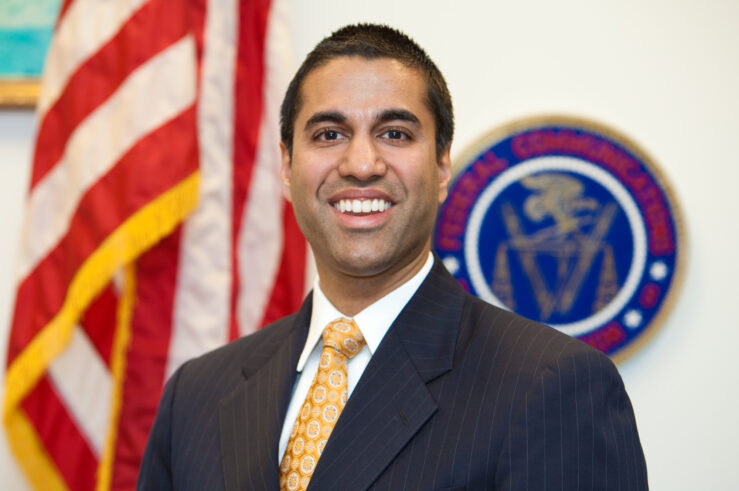Showing archive for: “Economics”
FCC restrictions on joint sales agreements: Yet another FCC rule without basis in evidence or economics
Recently, Commissioner Pai praised the introduction of bipartisan legislation to protect joint sales agreements (“JSAs”) between local television stations. He explained that JSAs are contractual agreements that allow broadcasters to cut down on costs by using the same advertising sales force. The efficiencies created by JSAs have helped broadcasters to offer services that benefit consumers, ... FCC restrictions on joint sales agreements: Yet another FCC rule without basis in evidence or economics
Don’t tread on my Internet
Ben Sperry and I have a long piece on net neutrality in the latest issue of Reason Magazine entitled, “How to Break the Internet.” It’s part of a special collection of articles and videos dedicated to the proposition “Don’t Tread on My Internet!” Reason has put together a great bunch of material, and packaged it in ... Don’t tread on my Internet
FCC Preemption of State Municipal Broadband Restrictions is Legally Problematic and Bad for Taxpayers and Competition
By a 3-2 vote, the Federal Communications Commission (FCC) decided on February 26 to preempt state laws in North Carolina and Tennessee that bar municipally-owned broadband providers from providing services beyond their geographic boundaries. This decision raises substantial legal issues and threatens economic harm to state taxpayers and consumers. The narrow FCC majority rested its ... FCC Preemption of State Municipal Broadband Restrictions is Legally Problematic and Bad for Taxpayers and Competition
The Ninth Circuit botched its efficiencies analysis in the FTC v St Lukes antitrust case
Earlier this week the International Center for Law & Economics, along with a group of prominent professors and scholars of law and economics, filed an amicus brief with the Ninth Circuit seeking rehearing en banc of the court’s FTC, et al. v. St Luke’s case. ICLE, joined by the Medicaid Defense Fund, also filed an ... The Ninth Circuit botched its efficiencies analysis in the FTC v St Lukes antitrust case
Innovation Death Panels and Other Economic Shortcomings of the White House Proposed Privacy Bill
In short, all of this hand-wringing over privacy is largely a tempest in a teapot — especially when one considers the extent to which the White House and other government bodies have studiously ignored the real threat: government misuse of data à la the NSA. It’s almost as if the White House is deliberately shifting the public's gaze from the reality of extensive government spying by directing it toward a fantasy world of nefarious corporations abusing private information…. The White House’s proposed bill is emblematic of many government “fixes” to largely non-existent privacy issues, and it exhibits the same core defects that undermine both its claims and its proposed solutions. As a result, the proposed bill vastly overemphasizes regulation to the dangerous detriment of the innovative benefits of Big Data for consumers and society at large.
D.C. Circuit POM Wonderful Decision Begins to Rein in Excessive FTC Regulation of Commercial Speech
In a previous Truth on the Market blog posting, I noted that the FTC recently revised its “advertising substantiation” policy in a highly problematic manner. In particular, in a number of recent enforcement actions, an FTC majority has taken the position that it will deem advertising claims “deceptive” unless they are supported by two randomized ... D.C. Circuit POM Wonderful Decision Begins to Rein in Excessive FTC Regulation of Commercial Speech
FTC Staff Report Misses the Mark on “Internet of Things” Regulation
Today the Federal Trade Commission (FTC) missed the mark in authorizing release of a staff report calling for legislation and regulation of the “Internet of Things.” The Internet of Things is already affecting the daily lives of millions of Americans through the adoption of health and fitness monitors, home security devices, connected cars and household ... FTC Staff Report Misses the Mark on “Internet of Things” Regulation
In Memoriam: Henry G. Manne (1928-2015)
Henry Manne was a great man, and a great father. He was, for me as for many others, one of the most important intellectual influences in my life. I will miss him dearly. Following is his official obituary. RIP, dad. Henry Girard Manne died on January 17, 2015 at the age of 86. A towering figure ... In Memoriam: Henry G. Manne (1928-2015)
Si Monumentum Requiris, Circumspice
The famous epitaph that adorns Sir Christopher Wren’s tomb in St. Paul’s Cathedral – Si monumentum requiris, circumspice (“if you seek his monument, look around you”) – applies equally well to Henry Manne, who passed away on January 17. Wren left a living memorial to his work in St. Paul’s and the many other churches ... Si Monumentum Requiris, Circumspice
Transatlantic Trade Negotiations: Keeping Regulation in Check
Last week, the George Washington University Center for Regulatory Studies convened a Conference (GW Conference) on the Status of Transatlantic Trade and Investment Partnership (TTIP) Negotiations between the European Union (EU) and the United States (U.S.), which were launched in 2013 and will continue for an indefinite period of time. In launching TTIP, the Obama ... Transatlantic Trade Negotiations: Keeping Regulation in Check
Time for the FTC to Reform its Advertising Substantiation Program
In my just published Heritage Foundation Legal Memorandum, I argue that the U.S. Federal Trade Commission (FTC) should substantially scale back its overly aggressive “advertising substantiation” program, which disincentivizes firms from providing the public with valuable information about the products they sell. As I explain: “The . . . [FTC] has a long history of ... Time for the FTC to Reform its Advertising Substantiation Program
Abuse of Dominance by Patentees: A Pro-Innovation Perspective
In my just-published article in The Antitrust Source, I argue that the law and economics literature on patents and error cost analysis demonstrate that the recent focus by U.S. (and foreign) antitrust enforcers on single-firm patent abuses is misplaced, and may reduce incentives to innovate. I recommend that antitrust enforcers focus instead on restrictions among ... Abuse of Dominance by Patentees: A Pro-Innovation Perspective






